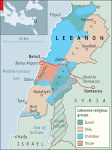Shortly after seven in the evening, as the crisp orange sun dropped down toward the Mediterranean horizon, those of us walking, running, fishing, or sitting along the corniche saw a beautiful sight high in the sky.
Descending toward South Beirut was a great big Middle East Airlines jet, the first commercial plane that we had seen in more than a week. Families already happy to be out enjoying the warm spring evening looked up and smiled; as I ran toward him, a man turned around to me with an excited look in his eyes that said, "do you know what that means?"; a young guy walking with friends waved at the airplane. And as it disappeared beyond the buildings of West Beirut, on its way to the airport, the airplane signaled yet another return to peace in Lebanon. After the government last night revoked its two decisions that targeted Hezbollah, the opposition removed its barricades from the road leading to the airport. Full of happy adrenaline, I started running faster, the laughter and easy conversation of the people I passed mixing nicely with the music of Bright Eyes on my i-pod. Even the soldiers slowly driving by with their hands on machine guns looked more relaxed than ever. One (without a gun in his hand) was chatting casually on his mobile phone. Another stared intently toward the west. I looked over to see what his eyes were fixed upon and saw nothing but the setting sun.
There is real damage here, some of it irrevocable. At least 81 people died. Homes and offices are destroyed. Windows are still broken. The free press now questions its ability to exist without facing deadly repercussions. Students are still not yet scheduled to go back to classes. And the country must now live with the fresh memory of armed Lebanese militias turning their guns on each other for the first time in nearly twenty years.
Contrary to what you may read in the Israeli and American press, though, Hezbollah has not taken over Lebanon, nor do they claim to ever want to do such a thing (but they proved beyond any shadow of a doubt that they could). What they have created (yes, through force), is a new national order, if not also a new world order, where Hezbollah and its allies have not only shown their military strength but also, in doing so, have moved closer toward creating a government in which they--and the Shia they more or less represent--are no longer a marginalized minority. Syria and Iran, by extension, have advanced to points where they must be seen as viable regional and global powers, respectively. The United States and Israel live another day without one of its enemies completely destroyed and with a nuanced world where diplomacy rather than cluster bombs increasingly seems the best way forward.
To some people, this is all a tragedy; to others, it's a victory. To people like Rami Khouri and Qifa Nabki it's an opportunity. For those of on the corniche this evening, it's a reminder that, if nothing else, the sun also rises.
Subscribe to:
Post Comments (Atom)

No comments:
Post a Comment